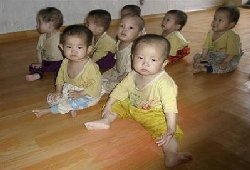Millions of North Korean women and children are facing a critical shortage of food as aid supplies to the isolated communist nation dry up, the United Nations' food agency has warned.
With sanctions against North Korea tightening and the North Korean government itself stepping up restrictions on aid groups, the World Food Program (WFP) says it has received just 15 per cent of the $504m it needs.
Without that aid, it says, some 6.2 million vulnerable North Koreans are at risk.
The warning comes during a lean growing season, with food shortages in cash-strapped North Korea worsening ahead of the November harvest.
Speaking to reporters in Beijing, Torben Due, the WFP's representative for North Korea, said aid contributions for North Korea had dried up after North Korea carried out a nuclear test in May.
The test drew international condemnation and a tightening of international sanctions against North Korea and Due said he believed donors were responding to the political situation in North Korea.
"It's a very sensitive area," he said, adding that he understood why donors were questioning where the aid was going.
'Needs of the people'
"But my angle is as a humanitarian. Being a humanitarian organization you should look at the needs of the people. WFP does not engage in the political part of it."
The UN estimates that overall 8.7 million North Koreans depend on regular food aid.
The WFP had planned a relief operation to target 6.2 million, but with only a fraction of the contributions it needs it has had to scale that back to 2 million.
Compounding the difficulties, Due said the North Korean government has also ordered to the WFP to scale back its operations and to get rid of its Korean-speaking staff.
He said they were not given a reason by the North Korean government for the staff cut.
Starting from last month the agency has also been allowed to operate in only 57 counties in the country, rather than the previous 131 counties.
Undernourished
Due said that decades of shortages and international isolation had taken a heavy toll on North Korea's people.
"We have a situation where a very large part of the population has been undernourished for 15 or 20 years."
In some parts of North Korea, some women weigh just 45 kg when they give birth, he added, citing a medical survey.
"The children that survive these conditions will be born with compromised immune systems… and that will contribute to their stunting," Due said.
"It's a problem which goes from one generation to the next."
PHOTO CAPTION
Malnourished children are seen at an orphanage in Chongjin city, North Korea, June 20, 2008 in this photo released by World Food Programme.
Source: Aljazeera.net


 Home
Home Discover Islam
Discover Islam Quran Recitations
Quran Recitations Lectures
Lectures
 Fatwa
Fatwa Articles
Articles Fiqh
Fiqh E-Books
E-Books Boys & Girls
Boys & Girls  Articles
Articles










